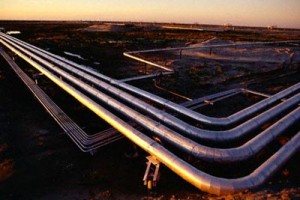
Pipeline Politics in Europe
 The political debate surrounding natural gas in Washington is currently focused on whether or not the Department of Energy will allow more U.S. natural gas exports. Meanwhile, in Southeastern Europe there is another decision in the offing that will significantly impact natural gas markets around the world: building a natural gas pipeline to connect the Caspian to Europe.
The political debate surrounding natural gas in Washington is currently focused on whether or not the Department of Energy will allow more U.S. natural gas exports. Meanwhile, in Southeastern Europe there is another decision in the offing that will significantly impact natural gas markets around the world: building a natural gas pipeline to connect the Caspian to Europe.
The Caspian Basin is endowed with large natural gas reserves, and there have been concerted efforts on behalf of European politicians, diplomats, and international companies to find a way to develop those energy resources and transport them to Europe. One motivation is to reduce Europe’s dependence on Russian natural gas (36% of Europe’s imports come from Russia) because Russia has demonstrated a knack for using energy as a political tool.
If Europe could somehow gain access to natural gas from the Caspian, the thinking goes, Europe could significantly reduce its vulnerability to Russian political whims. A group of international oil and gas companies including BP and Statoil are working with the State Oil Company of the Azerbaijan Republic (SOCAR) to develop one of the largest natural gas fields in the world, the Shah Deniz field. Located offshore of Azerbaijan in the Caspian Sea, it holds an estimated 40 trillion cubic feet of natural gas. The Shah Deniz Consortium is expected to decide in June between two competing pipeline projects that will deliver Azeri gas to Western Europe.
The gas will first travel through the existing South Caucuses Pipeline (SCP), which runs from the Caspian, through Azerbaijan and Georgia to the Georgian-Turkish border. From there, the gas will be transported through the proposed Trans-Anatolian gas pipeline (TANAP), which travels the length of Turkey to its border with Bulgaria. At that point, the story gets a little interesting.
There are two competing projects to carry Caspian gas from the Turkish-Bulgarian border to Western Europe. The first is the Nabucco Pipeline, which has long been the political favorite. Nabucco was originally intended to run from the Caspian through Azerbaijan and Turkey, then north through Bulgaria, Romania, and Hungary, before terminating in Austria. TANAP supplanted Nabucco from the Caspian through Turkey. As a result, the revised “Nabucco-west” pipeline would run from the Turkish-Bulgarian border to Austria. (click here for a great map of the pipelines).
For years, Nabucco has been the darling of the West because it was the main alternative to the Russian proposal, the South Stream project, which would carry Russian gas under the Black Sea to Bulgaria and then onwards to Western Europe. Nabucco would cut Russia out of the equation, enhancing European energy security. Many doubt the feasibility and seriousness of the South Stream project, as it would be enormously expensive.
After TANAP moved forward, the Russian proposed South Stream looks even less viable. Instead, the main competitor to Nabucco to carry gas from TANAP to the rest of Europe is the so-called Trans-Adriatic Pipeline (TAP). A latecomer to the competition, TAP would carry gas through Greece, Albania, and then across the Adriatic Sea to Italy. TAP has not been on the political radar as much as Nabucco, but the consortium involved in TAP believes it has advantages over its competitor. For example, TAP is shorter, and therefore less expensive, and it will terminate in Italy, a much larger market than the smaller countries of Eastern Europe that Nabucco will traverse. TAP also has a political bonus of adding a major development project to economically-depressed Greece.
The Shah Deniz Consortium is expected to deliver a decision in June 2013 on how it plans to transport Azeri gas to Western Europe.
While much is riding on the decision for the companies involved, the business case is often clouded with politics. TAP seems to have an edge on Nabucco in terms of economics, but removing the geopolitical jockeying is not easy. The countries in Central and Eastern Europe that depend heavily on Russian energy will not be pleased if Nabucco loses out.
However, European policymakers are mandated to maintain impartiality. From an energy security perspective, as Caspian gas looks more likely to run the Southern Corridor through TANAP (cutting out Russia), many policymakers in Western Europe are indifferent to Nabucco or TAP. Accessing gas from a source other than Russia would achieve the objective of diversification, making it irrelevant whether the project runs through the Balkans or across the Adriatic.
Still, building a pipeline that will travel 2,500 miles from the Caspian to Western Europe is daunting and will take years to complete. The Shah Deniz Consortium estimates that it can deliver 10 billion cubic meters per year to Europe with first deliveries expected in 2019. Keep an eye out for the June decision.







[…] American Security Project The political debate surrounding natural gas in Washington is currently focused on whether or […]
[…] ‘pipeline politics’ over how to bring natural gas to Europe from the Caspian is complex. Today’s decision […]